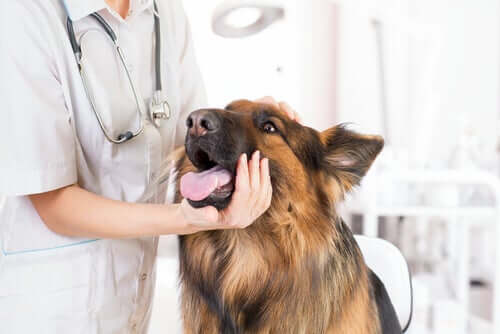Canine Pseudopregnancy and Lactation

A canine pseudopregnancy happens in nearly 60% of non-sterilized female dogs, and the dogs can secrete milk even if they’re not pregnant. This is most likely due to a hormonal imbalance after her latest estrous cycle. We’ll tell you more about this today.
What is canine pseudopregnancy?
This is not exactly a disease, however, you must keep watch and take a few measures to avoid any complications that may arise when confronted with a canine pseudopregnancy.
These are some of the signs in a dog that’s going through a pseudopregnancy–in addition to swollen mammary glands and lactation:
- Belly growth
- They treat their toys or other objects as if they were puppies (for example, they take them to bed, lick them, etc.)
- Restlessness, nervousness, and sadness
- Yelping and whimpering
- They scratch the floor and the walls
- A dog may refuse to go for a walk and may hide
- Lack of appetite

The reason why a bitch who isn’t pregnant may have enlarged mammary glands and milk secretion could be psychological. However, for the most part, canine pseudopregnancy is a hormonal imbalance that usually afflicts 6 out of every 10 females who aren’t sterilized.
Canine pseudopregnancy and lactation
OK, but what’s the reason for a “phantom” pregnancy in these animals? Well, everything seems to indicate that it’s a survival mechanism.
In their natural habitat, a bitch would be able to raise another dog’s litter after they lost their biological mother.
This behavior is also present in wolves, the ancestors of our current dogs. When a dominant female of a pack stops lactating for any reason then the rest of the female dogs develop a pseudopregnancy so they can lactate and contribute to the nursing of her puppies.
Canine pseudopregnancy: What to do
In most cases, you won’t need any type of treatment if your dog is going through a psychological pregnancy. This canine condition usually disappears on its own after some time. In any case, keep a watchful eye on her as you may require veterinarian advice in some instances, particularly if the pseudopregnancy comes with negative side effects.
For example, if your bitch produces too much milk it may lead to mastitis. This happens when certain microorganisms go through the nipple channel, creating an infection in her mammary glands.
When confronted with this situation, a professional would medicate the dog with drugs that decrease prolactin, a hormone. They may also prescribe an anxiolytic, that is, a drug that reduces anxiety if the animal has a serious behavior disorder.
Other actions you can take

Commonly a canine pseudopregnancy will disappear in three weeks –regardless of whether it’s psychological or hormonal. In the meantime, you can take some measures such as:
- Entertain her with more games than usual
- Provide her with more opportunities to exercise
- Try to keep her from licking her nipples, as it stimulates lactation
- Remove the objects she’s adopted as “puppies”
- Be patient and affectionate, it’ll help her recover her emotional stability
- Consider sterilizing her
You must take into account that hormone imbalances in bitches are recurrent. They’re the result of progesterone, which readies them for motherhood.
This is why it also triggers the production of prolactin, the hormone that enlarges the mammary glands and increases milk production and maternal behavior.
So, the professional advice is to seriously consider the option of sterilizing your bitch. It’s not only the best way to prevent unwanted pregnancy, but also a pseudopregnancy that could lead to health problems such as mammary tumors or uterine infections.
A canine pseudopregnancy happens in nearly 60% of non-sterilized female dogs, and the dogs can secrete milk even if they’re not pregnant. This is most likely due to a hormonal imbalance after her latest estrous cycle. We’ll tell you more about this today.
What is canine pseudopregnancy?
This is not exactly a disease, however, you must keep watch and take a few measures to avoid any complications that may arise when confronted with a canine pseudopregnancy.
These are some of the signs in a dog that’s going through a pseudopregnancy–in addition to swollen mammary glands and lactation:
- Belly growth
- They treat their toys or other objects as if they were puppies (for example, they take them to bed, lick them, etc.)
- Restlessness, nervousness, and sadness
- Yelping and whimpering
- They scratch the floor and the walls
- A dog may refuse to go for a walk and may hide
- Lack of appetite

The reason why a bitch who isn’t pregnant may have enlarged mammary glands and milk secretion could be psychological. However, for the most part, canine pseudopregnancy is a hormonal imbalance that usually afflicts 6 out of every 10 females who aren’t sterilized.
Canine pseudopregnancy and lactation
OK, but what’s the reason for a “phantom” pregnancy in these animals? Well, everything seems to indicate that it’s a survival mechanism.
In their natural habitat, a bitch would be able to raise another dog’s litter after they lost their biological mother.
This behavior is also present in wolves, the ancestors of our current dogs. When a dominant female of a pack stops lactating for any reason then the rest of the female dogs develop a pseudopregnancy so they can lactate and contribute to the nursing of her puppies.
Canine pseudopregnancy: What to do
In most cases, you won’t need any type of treatment if your dog is going through a psychological pregnancy. This canine condition usually disappears on its own after some time. In any case, keep a watchful eye on her as you may require veterinarian advice in some instances, particularly if the pseudopregnancy comes with negative side effects.
For example, if your bitch produces too much milk it may lead to mastitis. This happens when certain microorganisms go through the nipple channel, creating an infection in her mammary glands.
When confronted with this situation, a professional would medicate the dog with drugs that decrease prolactin, a hormone. They may also prescribe an anxiolytic, that is, a drug that reduces anxiety if the animal has a serious behavior disorder.
Other actions you can take

Commonly a canine pseudopregnancy will disappear in three weeks –regardless of whether it’s psychological or hormonal. In the meantime, you can take some measures such as:
- Entertain her with more games than usual
- Provide her with more opportunities to exercise
- Try to keep her from licking her nipples, as it stimulates lactation
- Remove the objects she’s adopted as “puppies”
- Be patient and affectionate, it’ll help her recover her emotional stability
- Consider sterilizing her
You must take into account that hormone imbalances in bitches are recurrent. They’re the result of progesterone, which readies them for motherhood.
This is why it also triggers the production of prolactin, the hormone that enlarges the mammary glands and increases milk production and maternal behavior.
So, the professional advice is to seriously consider the option of sterilizing your bitch. It’s not only the best way to prevent unwanted pregnancy, but also a pseudopregnancy that could lead to health problems such as mammary tumors or uterine infections.
All cited sources were thoroughly reviewed by our team to ensure their quality, reliability, currency, and validity. The bibliography of this article was considered reliable and of academic or scientific accuracy.
- Vascellari, M., Capello, K., Carminato, A., Zanardello, C., Baioni, E., & Mutinelli, F. (2016). Incidence of mammary tumors in the canine population living in the Veneto region (Northeastern Italy): Risk factors and similarities to human breast cancer. Preventive veterinary medicine, 126, 183-189.
- Creel, S. R., Monfort, S. L., Wildt, D. E., & Waser, P. M. (1991). Spontaneous lactation is an adaptive result of pseudopregnancy. Nature, 351(6328), 660-662.
- Singh, L. K., Bhimte, A., Pipelu, W., Mishra, G. K., & Patra, M. K. (2018). Canine pseudopregnancy and its treatment strategies. depression, 17(19), 20.
- Smith, M. S., & Mc Donald, L. E. (1974). Serum levels of luteinizing hormone and progesterone during the estrous cycle, pseudopregnancy and pregnancy in the dog. Endocrinology, 94(2), 404-412.
- BAŞTAN, A., Findik, M., Erunal, N., Aslan, S., & Kilicoglu, C. (1998). The use of cabergoline for treatment of pseudopregnancy in dogs with the purpose of suppressing lactation. Reproduction in Domestic Animals, 33(2).
This text is provided for informational purposes only and does not replace consultation with a professional. If in doubt, consult your specialist.








